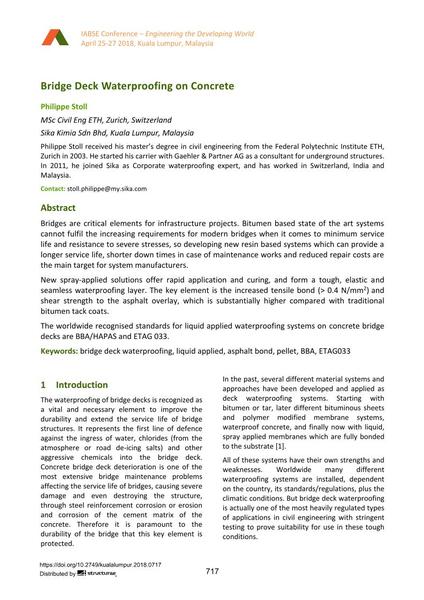Bridge Deck Waterproofing on Concrete

|
|
|||||||||||
Détails bibliographiques
| Auteur(s): |
Philippe Stoll
(MSc Civil Eng ETH, Zurich, Switzerland; Sika Kimia Sdn Bhd, Kuala Lumpur, Malaysia)
|
||||
|---|---|---|---|---|---|
| Médium: | papier de conférence | ||||
| Langue(s): | anglais | ||||
| Conférence: | IABSE Conference: Engineering the Developing World, Kuala Lumpur, Malaysia, 25-27 April 2018 | ||||
| Publié dans: | IABSE Conference Kuala Lumpur 2018 | ||||
|
|||||
| Page(s): | 717-719 | ||||
| Nombre total de pages (du PDF): | 3 | ||||
| DOI: | 10.2749/kualalumpur.2018.0717 | ||||
| Abstrait: |
Bridges are critical elements for infrastructure projects. Bitumen based state of the art systems cannot fulfil the increasing requirements for modern bridges when it comes to minimum service life and resistance to severe stresses, so developing new resin based systems which can provide a longer service life, shorter down times in case of maintenance works and reduced repair costs are the main target for system manufacturers. New spray-applied solutions offer rapid application and curing, and form a tough, elastic and seamless waterproofing layer. The key element is the increased tensile bond (> 0.4 N/mm²) and shear strength to the asphalt overlay, which is substantially higher compared with traditional bitumen tack coats. The worldwide recognised standards for liquid applied waterproofing systems on concrete bridge decks are BBA/HAPAS and ETAG 033. |
||||
